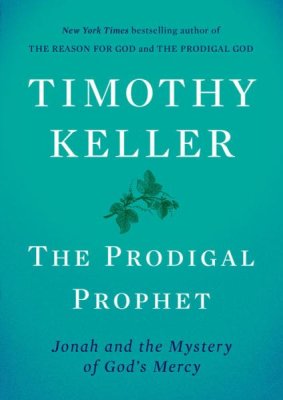— The Prodigal Prophet —
Jonah and the Mystery of God’s Mercy
by Timothy Keller
–Review by Teri Hyrkas
“You cannot conceive, my child, nor can I or anyone, the appalling strangeness of the mercy of God.” Graham Greene from Brighton Rock
Can you think of a book in the Bible that is named after someone whose life is a bad example for others? How about the book of Jonah? It seems likely that many people are familiar with Jonah’s story, particularly the part that tells about Jonah being swallowed by a big fish because of his resistance to God’s command to preach to the people of Nineveh. But how many have read all four chapters of this short Old Testament book and been disturbed by Jonah’s never ending bad attitude? In The Prodigal Prophet: Jonah and the Mystery of God’s Mercy (Viking, 2018), Timothy Keller zeroes in on this puzzling conduct by Jonah. As he brings the prophet’s bad behavior to the fore, Keller offers perspectives so provocative that the ancient tale of Jonah becomes fresh, cogent, and surprising once again.
Keller, who is a theologian and apologist as well a retired pastor, writes that the “richness” of Jonah’s story comes from its “varied applicability to…much of human life and thought.” Keller says that because of Jonah’s human frailties, some obvious and some obscured, Jonah has been the source of three different sermon series over Keller’s career. The final Jonah series was delivered in New York City during Keller’s tenure as the senior pastor of Manhattan’s Redeemer Presbyterian Church.
One reason that the story of Jonah is “more than up to the task of powerfully addressing the needs” of individuals in radically difficult situations, says Keller, is that like many people, Jonah found himself facing a disastrous life storm, a storm of his own making, that was not going to end well unless he was the recipient of a generous gift of undeserved mercy. This is the complication that Keller addresses in the first part of The Prodigal Prophet: How can God be both merciful and just? Keller points out that the story of Jonah holds important keys to untangling this theological problem.
Keller also relates that the book of Jonah deals with heart problems — that is, who should we (believers in God) love, and how might we best love them? It is the distressing final chapter of Jonah that raises this question for Keller and for us. Jonah was sent by God as a missionary to Nineveh to preach to them and announce that God intended to overthrow their nation if they did not repent of their destructive ways, so repent they did. One would think that Jonah would have been happy that the entire violent, sinful population repented in sackcloth and ashes so that God would not destroy them, but Jonah was not happy; he was angry. He did not love the Ninevites as God did. Jonah’s loves were out of order, and no wonder — Jonah had not taken on God’s definition of love but rather his culture’s, which did not extend to Nineveh, his country’s murderous enemy.
What Keller wants to point out here is that Christians often buy into the surrounding culture’s definitions of love, including love of nation, love of religion, and romantic love. In the following paragraphs Keller describes the way today’s Christians can be influenced by Western culture’s ideas of love as it pertains to marriage and parenting:
“One of the greatest contrasts between our Western culture and Christianity comes at exactly this point. Our society defines love basically as a transaction for self-fulfillment. It is a market-based definition. You stay in a love relationship as long as both of you are profiting from it. This approach, however, has led to widespread damage.
“[In] our individualistic society even marriage has been reshaped into a consumer relationship that exists only so long as each party benefits and profits. As soon as the relationship requires sacrifice on your part — more giving than receiving– society says it can be discarded. Parenting, however, stubbornly resists this modern attitude. It still requires substitutionary sacrifice. You can suffer voluntarily, in love, in a way that gives [children] life, or they’re going to suffer involuntarily for their whole life.”
Throughout The Prodigal Prophet, Keller draws parallels between Jonah’s imperfect exploits and various present-day struggles. He uses Jonah as an example of someone who is called by God, yet he makes numerous mistakes in life and blunders along convinced that he is right, getting mad at God, resenting the love and kindness God extends to outsiders and failing to identify the grace and mercy that God has bestowed on him. God does not abandon Jonah during his extremely rebellious periods but continues to be present with him. God also cares for the prophet with amazing tenderness even when Jonah throws a tantrum in God’s presence. Keller writes that the text makes plain here that both those who try to follow God AND those who do not can be recipients of God’s compassion and forgiveness despite horrendous sinful failures.
The final, short chapter in The Prodigal Prophet: Jonah and the Mystery of God’s Mercy was a delightful surprise. In this chapter, Keller reminds us that it is easy to forget to ask some very basic questions about the scriptures, questions we would surely ask about any other material we read. I hope you will read and be provoked by Keller’s book about Jonah, The Prodigal Prophet.

